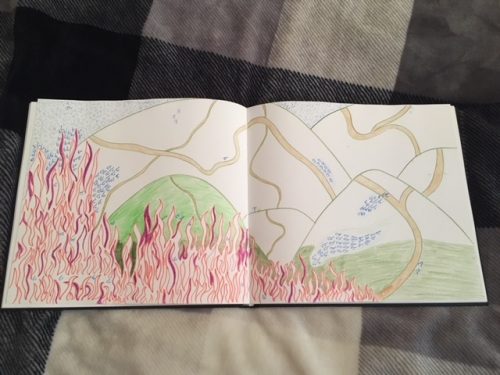
The Deep End
Today was our last day of classes at LISPA. Each of our six final sessions ended with applause and a few tears, and I feel extremely full with our instructors’ parting lessons and stories as well as my own emotions.
“But wait!” you might exclaim. “You still have four weeks left!! WHAT DO YOU MEAN NO MORE CLASSES!?!?”
Well see here, my young caterpillar, that’s what graduate school is all about.
First, the EDPP program is a bit different from the regular Columbia school year. Instead of early to mid-May, we end our time in school in mid-June. We have three semesters: Fall (twelve weeks), Spring (twelve weeks), and a shorter eight-week Summer semester. Scheduling is one of the compromises for these two institutions to work together.
For this final shorter semester, there are classes for the first four weeks, a week-long break, and then we are completely on our own for the final four. This time is used to work on personal projects, group projects, and another special project I won’t spoil in case you join a future cohort. I can’t spill all the secrets.
As we’ve started to work on these projects, the provocations come from ourselves and each other rather than our facilitators. We receive almost no guidance, and the tools we use are welcome to come from our journey here and the previous places where we’ve been. The projects are up for our own interpretation. OH ME, OH MY. This is perhaps the biggest difference between undergrad and graduate schools in my eyes: gaining autonomy.
Throughout the year, there is a phrase that is both comforting and frustrating for me to hear, and it is used with frequency. “There is no right, there is no wrong.” For me, what this statement means is that I have the autonomy to discern what works and what doesn’t work for me. Since we are an international program, what works for each student will be different. This outlook encourages us to develop our own system, and, at the same time, be open to others’ views on the world and art. These views are what we will take with us, and it is up to us to defend them and seek validation from ourselves. As many of my classmates and I have felt, no amount of outside approval will ever be enough.
I feel that in Chicago before Columbia/LISPA, I was creating work with companies that I depended on to give me inspiration. I wouldn’t take the risk to create a project that I could see lasting beyond a variety show performance or a single run. I thought my limitation was that I didn’t have enough tools in my tool-belt to express the art I wanted to create. What I have found on this journey, though, is much more sustainable. I’ve found inspiration in my surroundings, so that as long as I have a hunger to create, there will be something to create. Of course I also now have many “tools”— ways to research, forms or masks of expression, and techniques — as well as practical application of them to see how they can manifest in the space. I’m excited to take myself, with all my gains and losses, into the world and see how it’s changed me as an artist and a person.
There is a shadowy side to this, too. The confidence in my experiences here still doesn’t take away the anxiety of creating a new project. I still have a fear that what has worked for me here won’t apply when I’m outside of this geographical and educational bubble. I’m still afraid my personal project will be a complete disaster. I have to believe every creator feels that way to some extent, though. If you do as well, take comfort in the fact that Anne Bogart does, too, which Ashley, my fellow cohort-member, recently reminded me of. (By the way, I highly recommend reading or rereading A Director Prepares for anyone considering the EDPP journey.) I’ll end it here with a quote from her chapter on Terror, which contains Martha Graham’s famous words to Agnes DeMille.
“There is a vitality, a life-force, a quickening that is translated through you into action, and because there is only one of you in all time, this expression is unique. And if you block it, it will never exist through any other medium and be lost. The world will not have it. It is not your business to determine how good it is; nor how valuable it is; nor how it compares with other expressions. It is your business to keep it yours clearly and directly, to keep the channel open. You do not have to believe in yourself or your work. You have to keep open and aware directly to the urges that motivate you.” (Bogart, pg. 96)

Drawing research for my personal project…what does it all mean?!
